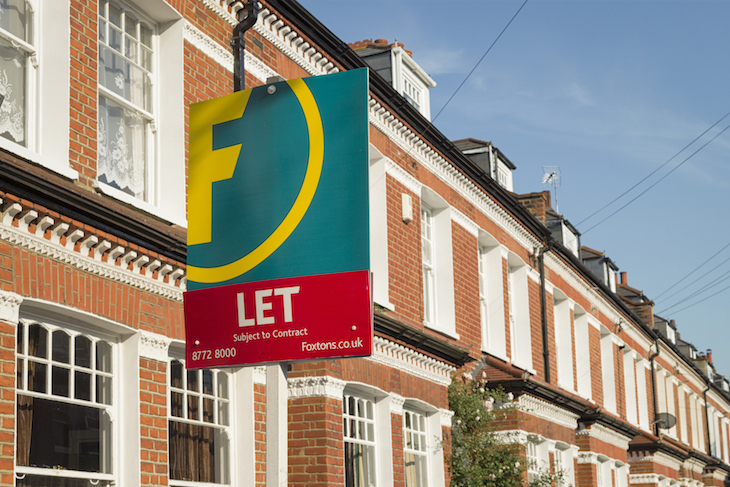Those twice-weekly sales emails from Foxtons that the recent GDPR clean-up has failed to stop have lately been spattered with the words ‘recent price reduction’ in big red capitals. Hence no surprise that the glossy estate agent and bellwether of London residential property has just reported a first-half loss of £2.8 million, compared to £3.8 million profit in the first half of last year and reflecting a sharp drop in sales revenues. Chief executive Nic Budden says his marketplace ‘is undergoing a sustained period of very low activity levels’.
Foxtons’ flotation in 2013 at an absurd valuation of £650 million was the strongest possible indicator of overheating house prices at the time; likewise, its £360 million sale by founder Jon Hunt to private equity investors at the very peak of the previous boom in 2007. Today its market capitalisation is just £140 million, the shares having been on a downward slide since stamp duty rises began to bite in 2015.
Brexit nervousness has been partially counterbalanced by a continuing influx of ‘safe haven’ buyers from other parts of the world, but the price of an average home in the capital has at last begun to drift downwards (as opposed to merely rising more slowly, the second-quarter fall having been 1.9 per cent according to Nationwide) and is expected by many pundits to continue falling until 2020. The interest rate rise widely expected this week will reinforce that trend.
But so far we’re talking about a correction, not a crash. Homeowners who bought before the last spurt of the rise should still be in the money, while first-time buyers have a slightly better chance of scrambling on to the property ladder. Not that I’m prejudiced against slick estate agents, you understand, but what’s bad for Foxtons is on the whole likely to be good for working Londoners.
Deutsche retreat
Deutsche Bank’s decision to move a portion of its ‘euro-clearing’ activity from London to Frankfurt hardly comes as a shock, since EU policymakers have long made plain that they prefer to see the clearing of euro-denominated trades — particularly in volatile derivatives markets that can threaten financial stability — remain under their own regulatory oversight. The German finance minister Olaf Scholz said just that last month, and similar moves by other firms may follow. But I doubt they will add up to the loss of 100,000 City jobs predicted by the London Stock Exchange — the owner of LCH, the City’s major clearing house which fears losing a big chunk of its business to its deadly rival Deutsche Börse.
In fact, Deutsche Bank’s move was described as being chiefly electronic, without direct job losses. And we must hope Bank of England Governor Mark Carney is right when he says that EU-related ‘local’ business of this kind is bound to leave these shores, but ‘global’ business will largely stay in London where it belongs.
We might also take comfort of a sort — perhaps I mean schadenfreude — from the fact that this story is about Deutsche Bank, which I described in June as being in much worse shape than our own big banks and deep into retrenchment mode. This week, the once-mighty German institution announced more job cuts in the US as well as its partial retreat from London. The City will build its own future whatever Brexit brings, but Deutsche Bank in its present diminished state was never likely to be a pillar of it.
Bared fangs
What are we to make of a 19 per cent fall in both Facebook and Twitter shares at the end of last week, with Facebook shedding a barely imaginable $120 billion of value in a single day? Of course there are factors relating to performance: Twitter user numbers have been declining and Facebook’s profitability is under threat as it strives to clean up after the Cambridge Analytica scandal. But in short, what the sudden reversal tells us is that valuations of America’s leading tech stocks have become insanely high. The five leaders — Facebook, Apple, Amazon, Netflix and Google, known acronymically as ‘faangs’ — are notionally worth more than the entire FTSE100, while the wider ‘Fang+’ index of high-tech companies listed in New York, including the likes of electric car-maker Tesla, has risen five times faster in recent times than the run-of-the-mill S&P500 index of US companies.
Aficionados say this all makes sense because the tech giants represent the future and still have amazing growth prospects despite occasional setbacks. Sceptics say we’ve heard that before, in the last euphoric run ahead of every major market correction. Analysts at Morgan Stanley have been talking about ‘signs of exhaustion’ in Wall Street’s early summer rally: ‘We think the selling has just begun.’ I stand by my warning a month ago of a bout of market turmoil ‘as early as August’.
Broadband dossier
My anecdote last week about upgrading to BT’s ‘superfast’ broadband provoked several readers, unasked, to tell me their own unsatisfactory experiences. So I thought we should compile a Spectator dossier on the subject — as we did to good effect on the issue of high street bank branch closures, on which your combined report reached the desks of a selection of banking’s top dogs. We did not persuade them to reverse the trend but I know we made them think about how to make it less irritating for customers.
In the same spirit, feel free (if your wifi connection is working) to tell me how good or bad the broadband service is where you live. I would have sent the results direct to BT chief executive Gavin Patterson, but he’s already on the way out and — after spending piles of shareholders’ money on football broadcasting rights — rumoured to have been discussing a new job running the Premier League. So instead we’ll send the file to chairman Jan du Plessis. My address, as ever, is martin@spectator.co.uk.
Got something to add? Join the discussion and comment below.
Get 10 issues for just $10
Subscribe to The Spectator Australia today for the next 10 magazine issues, plus full online access, for just $10.
You might disagree with half of it, but you’ll enjoy reading all of it. Try your first month for free, then just $2 a week for the remainder of your first year.















Comments
Don't miss out
Join the conversation with other Spectator Australia readers. Subscribe to leave a comment.
SUBSCRIBEAlready a subscriber? Log in